Breadcrumb
Blogs
Entries with Categorías Global Affairs Documentos de trabajo .
![Además del regreso a la Luna y la llegada a Marte, también se aceleran programas de viajes a asteroides [NASA] Además del regreso a la Luna y la llegada a Marte, también se aceleran programas de viajes a asteroides [NASA]](/documents/10174/16849987/gaj-foto-1.jpg)
▲ Además del regreso a la Luna y la llegada a Marte, también se aceleran programas de viajes a asteroides [NASA]
GLOBAL AFFAIRS JOURNAL / Javier Gómez-Elvira
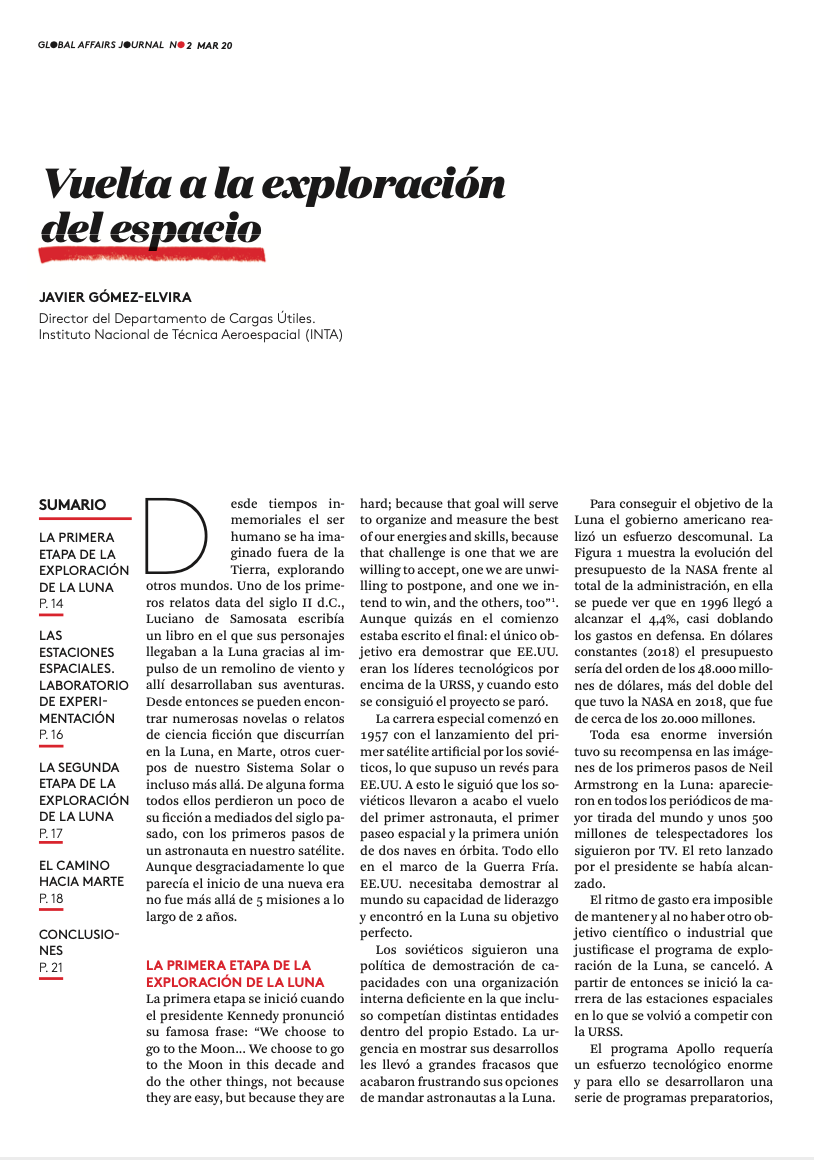 [Documento de 8 páginas. Descargar en PDF]
[Documento de 8 páginas. Descargar en PDF]
INTRODUCCIÓN
Desde tiempos inmemoriales el ser humano se ha imaginado fuera de la Tierra, explorando otros mundos. Uno de los primeros relatos data del siglo II d.C., Luciano de Samosata escribía un libro en el que sus personajes llegaban a la Luna gracias al impulso de un remolino de viento y allí desarrollaban sus aventuras. Desde entonces se pueden encontrar numerosas novelas o relatos de ciencia ficción que discurrían en la Luna, en Marte, otros cuerpos de nuestro Sistema Solar o incluso más allá. De alguna forma todos ellos perdieron un poco de su ficción a mediados del siglo pasado, con los primeros pasos de un astronauta en nuestro satélite. Aunque desgraciadamente lo que parecía el inicio de una nueva era no fue más allá de 5 misiones a lo largo de 2 años.
La primera etapa se inició cuando el presidente Kennedy pronunció su famosa frase: “We choose to go to the Moon... We choose to go to the Moon in this decade and do the other things, not because they are easy, but because they are hard; because that goal will serve to organize and measure the best of our energies and skills, because that challenge is one that we are willing to accept, one we are unwilling to postpone, and one we intend to win, and the others, too”. Aunque quizás en el comienzo estaba escrito el final: el único objetivo era demostrar que EEUU eran los líderes tecnológicos por encima de la URSS, y cuando esto se consiguió el proyecto se paró.
![Escena sobre anclaje en un asteroide para desarrollar actividad minera, de ExplainingTheFuture.com [Christopher Barnatt] Escena sobre anclaje en un asteroide para desarrollar actividad minera, de ExplainingTheFuture.com [Christopher Barnatt]](/documents/10174/16849987/gaj-foto-0.jpg)
▲ Escena sobre anclaje en un asteroide para desarrollar actividad minera, de ExplainingTheFuture.com [Christopher Barnatt]
GLOBAL AFFAIRS JOURNAL / Emili J. Blasco
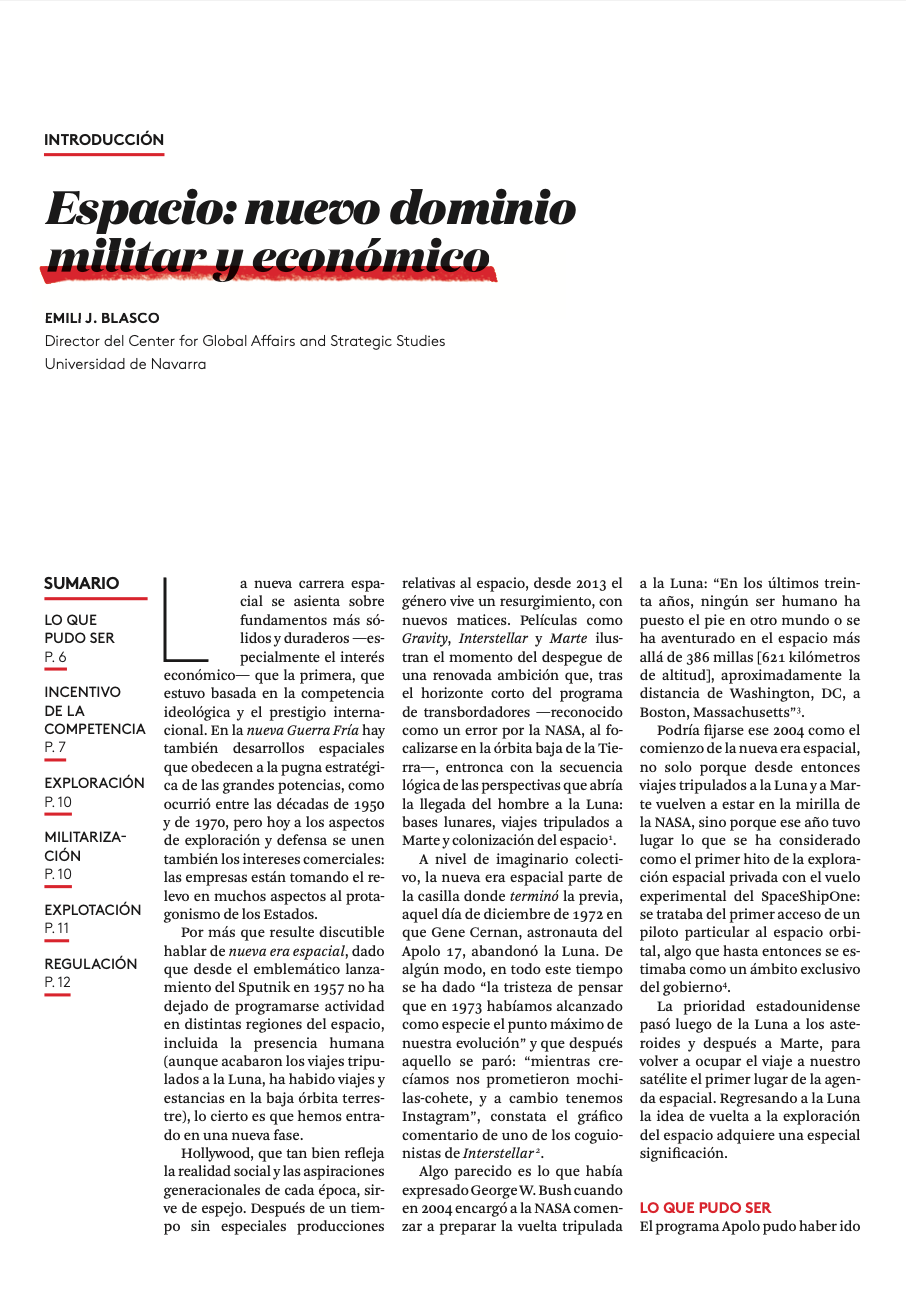 [Documento de 8 páginas. Descargar en PDF]
[Documento de 8 páginas. Descargar en PDF]
INTRODUCCIÓN
La nueva carrera espacial se asienta sobre fundamentos más sólidos y duraderos –especialmente el interés económico– que la primera, que estuvo basada en la competencia ideológica y el prestigio internacional. En la nueva Guerra Fría hay también desarrollos espaciales que obedecen a la pugna estratégica de las grandes potencias, como ocurrió entre las décadas de 1950 y de 1970, pero hoy a los aspectos de exploración y defensa se unen también los intereses comerciales: las empresas están tomado el relevo en muchos aspectos al protagonismo de los Estados.
Por más que resulte discutible hablar de nueva era espacial, dado que desde el emblemático lanzamiento del Sputnik en 1957 no ha dejado de programarse actividad en distintas regiones del espacio, incluida la presencia humana (aunque acabaron los viajes tripulados a la Luna, ha habido viajes y estancias en la baja órbita terrestre), lo cierto es que hemos entrado en una nueva fase.
Hollywood, que tan bien refleja la realidad social y las aspiraciones generacionales de cada tiempo, sirve de espejo. Después de un tiempo sin especiales producciones relativas al espacio, desde 2013 el género vive un resurgimiento, con nuevos matices. Películas como Gravity, Interstellar y Marte ilustran el momento del despegue de una renovada ambición que, tras el horizonte corto del programa de transbordadores –reconocido como un error por la NASA, al focalizarse en la órbita baja de la Tierra–, entronca con la secuencia lógica de las perspectivas que abría la llegada del hombre a la Luna: bases lunares, viajes tripulados a Marte y colonización del espacio.
A nivel de imaginario colectivo, la nueva era espacial parte de la casilla donde “terminó” la previa, aquel día de diciembre de 1972 en que Gene Cernan, astronauta del Apolo 17, abandonó la Luna. De algún modo, en todo este tiempo se ha dado “la tristeza de pensar que en 1973 habíamos alcanzado como especie el punto máximo de nuestra evolución” y que después aquello se paró: “mientras crecíamos nos prometieron mochilas-cohete, y a cambio tenemos Instagram”, constata el gráfico comentario de uno de los coguionistas de Interstellar.
Algo parecido es lo que había expresado George W. Bush cuando en 2004 encargó a la NASA comenzar a preparar la vuelta del hombre a la Luna: “En los últimos treinta años, ningún ser humano ha puesto el pie en otro mundo o se ha aventurado en el espacio más allá de 386 millas [621 kilómetros de altitud], aproximadamente la distancia de Washington, DC, a Boston, Massachusetts”.
Podría fijarse ese 2004 como el comienzo de la nueva era espacial, no solo porque desde entonces viajes tripulados a la Luna y a Marte vuelven a estar en la mirilla de la NASA, sino porque entonces tuvo lugar lo que se ha considerado como el primer hito de la exploración espacial privada con el vuelo experimental del SpaceShipOne: era el primer acceso de un piloto particular al espacio orbital, algo que hasta entonces era considerado como un ámbito exclusivo del gobierno.
La prioridad estadounidense pasó luego de la Luna a alguno de los asteroides y después a Marte, para volver a ocupar el viaje a nuestro satélite el primer lugar de la agenda espacial. Regresando a la Luna la idea de “vuelta” a la exploración del espacio adquiere una especial significación.
WORKING PAPER / Marianna McMillan
ABSTRACT
In appearance the internet is open and belongs to no one, yet in reality it is subject to concentrated tech firms that continue to dominate content, platform and hardware. This paper intends to highlight the importance in preventing any one firm from deciding the future, however this is no easy feat considering both: (i) the nature of the industry as ambiguous and uncertain and (ii) the subsequent legal complexities in defining the relevant market to assess and address their dominance without running the risk of hindering it. Thus, the following paper tries to fill the gap by attempting to provide a theoretical and practical examination of: (1) the nature of the internet; (2) the nature of monopolies and their emergence in the Internet industry; and (3) the position of the US in contrast to the EU in dealing with this issue. In doing so, this narrow examination illustrates that differences exist between these two regimes. Why they exist and how they matter in the Internet industry is the central focus.
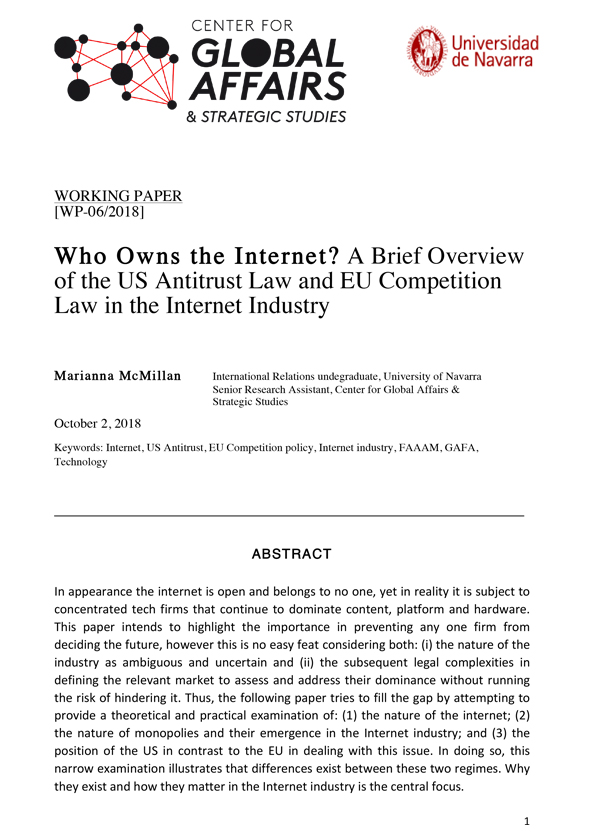 Download the document [pdf. 387K]
Download the document [pdf. 387K]
WORKING PAPER / N. Moreno, A. Puigrefagut, I. Yárnoz
ABSTRACT
The fundamental characteristic of the external action of the European Union (EU) in recent years has been the use of the so-called soft power. This soft power has made the Union a key actor for the development of a large part of the world’s regions. The last decades the EU has participated in a considerable amount of projects in the economic, cultural and political fields in order to fulfil the article 2 of its founding Treaty and thus promote their values and interests and contribute to peace, security and sustainable development of the globe through solidarity and respect for all peoples. Nevertheless, EU’s interventions in different regions of the world have not been free of objections that have placed in the spotlight a possible direct attack by the Union to the external States’ national sovereignties, thus creating a principle of neo-colonialism by the EU.
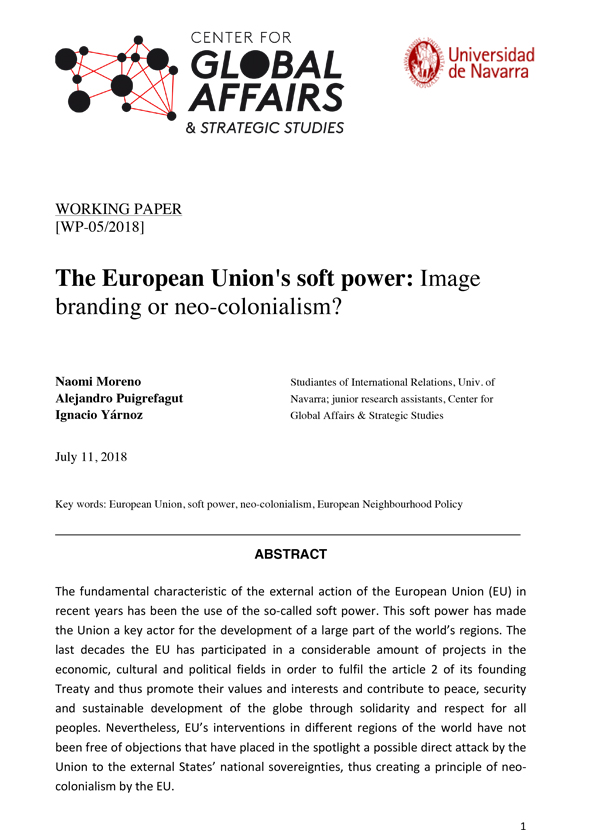 Download the document [pdf. 548K]
Download the document [pdf. 548K]
DOC. DE TRABAJO / A. Palacios, M. Lamela, M. Biera [Versión en inglés]
RESUMEN
La Unión Europea (UE) se ha visto especialmente dañada internamente por campañas de desinformación que han cuestionado su legislación y sus mismos valores. Las distintas operaciones desinformativas y la incapacidad comunicativa de las instituciones de la Unión Europea han generado un sentimiento de alarma en Bruselas. Apenas un año antes de la celebración de las elecciones al Parlamento Europeo, Europa ha concentrado muchos de sus esfuerzos en hacer frente al desafío desinformativo, generando nuevas estrategias y grupos de trabajo como el Stratcom Task Force o el grupo de expertos de la Comisión Europea.
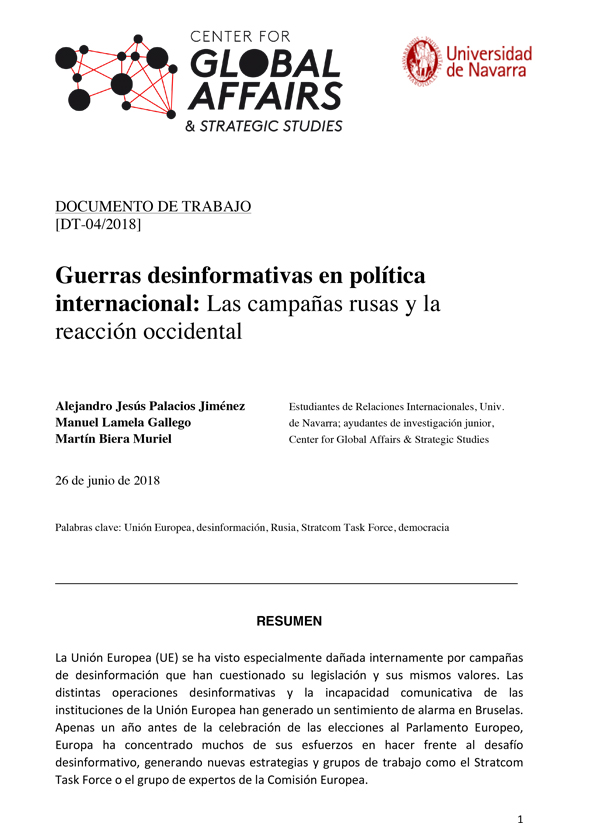 Descargar el documento completo [pdf. 381K]
Descargar el documento completo [pdf. 381K]
DOCUMENTO DE TRABAJO / María Granados Machimbarrena
RESUMEN
A pesar de la sentencia HIRSI Y JAMAA, de 2012, Italia fue condenada en 2015 una vez más por el Tribunal Europeo de Derechos Humanos por detención ilegal y devolución sumaria y colectiva de varios emigrantes. Los hechos ocurrieron en 2011, cuando los demandantes viajaron en un barco a través del Mediterráneo y fueron interceptados por buques italianos. Los emigrantes fueron traslados a la isla de Lampedusa, y detenidos en el Centro di Soccorso e Prima Accoglienza (CSPA), en una área reservada a los nacionales tunecinos. Según los demandantes, fueron detenidos en habitaciones superpobladas y sucias, sin contacto con el exterior. Los acontecimientos tuvieron lugar inmediatamente después de la primavera árabe. Las cuestiones planteadas frente al Tribunal por los demandantes y los argumentos planteados por los jueces son relevantes en el contexto actual de crisis europea en la gestión de los flujos de refugiados por las instituciones de la UE y sus Estados miembros.
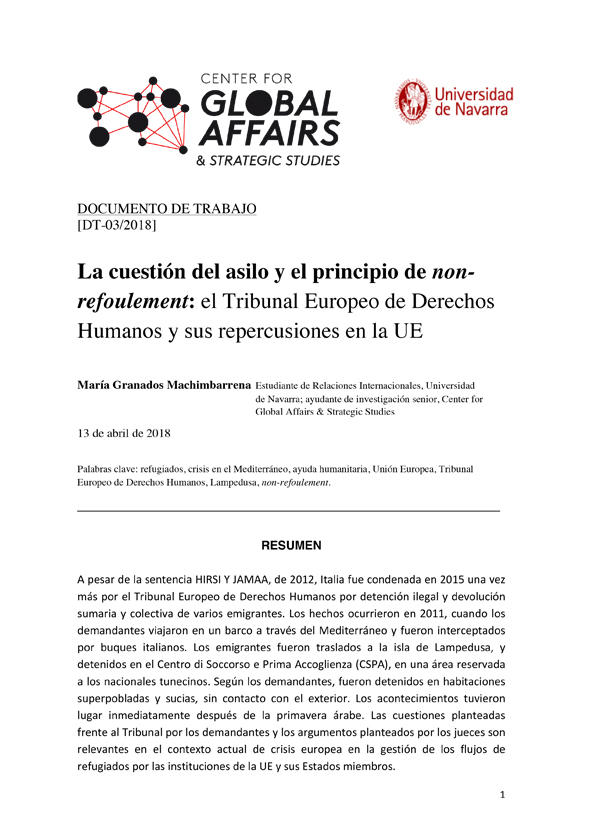 Descargar el documento completo [pdf. 6,4MB]
Descargar el documento completo [pdf. 6,4MB]
DOCUMENTO DE TRABAJO / Lucía Serrano Royo
RESUMEN
La Unión Europea nació como un mecanismo de cooperación entre países, pero su reciente historia, hace que el sistema sea aún muy frágil. A su vez, su diversidad, hace que la toma de decisiones sea compleja y que entren en juego numerosos intereses políticos, que pueden entrar en conflicto. Uno de los acontecimientos más relevantes que está teniendo lugar en la actualidad y que ha hecho tambalear los pilares de la Unión es “El Brexit”, la salida de Reino Unido como estado miembro de la Unión. Este escrito analizará la lenta aplicación del artículo 50 del Tratado de la Unión Europea, que se activa por primera vez en la historia. Además, analiza los motivos en el contexto europeo e internos que han llevado a esta situación y las consecuencias desde un punto de vista político, económico y social. Ante este clima de inestabilidad e incertidumbre, se plantearán diferentes alternativas a esta situación y se analizará cómo la Unión Europea ha dado respuesta a este problema en su Libro Blanco, donde se han establecido diferentes escenarios para la continuación de la Unión.
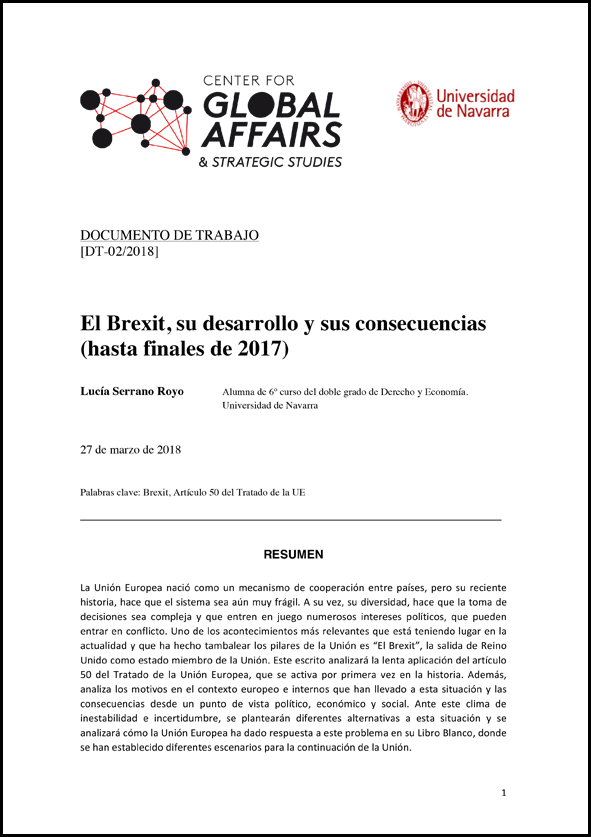 Descargar el documento completo [pdf. 4,4MB]
Descargar el documento completo [pdf. 4,4MB]
DOC. DE TRABAJO / Iñigo González Inchaurraga
RESUMEN
El principal, aunque no el único, elemento de contención entre Estados Unidos y China es Taiwán. Mientras que Washington mantiene una política de una sola China, Pekín defiende el principio de “una sola China”, proclamando que solo hay una China en el mundo y que tanto la isla de Taiwán como la zona continental son la misma República Popular China. Las autoridades chinas también sostienen que la soberanía y el territorio chino no pueden dividirse. A los ojos de Pekín, Taiwán es una provincia renegada surgida de la guerra civil china, por lo que la reunificación es la única opción de futuro para la isla. Esta reunificación, preferiblemente, debería producirse de manera pacífica, pero el uso de la fuerza tampoco puede descartarse si Taiwán pretendiese una independencia de jure. Por su parte, el Gobierno de Taipéi reclama su estatus como Estado soberano. El caso es que estando a finales de la década de 2010, resulta complicado seguir pidiendo a China que cumpla con el Derecho Internacional en relación, por ejemplo, a la resolución del Tribunal Permanente de Arbitraje y las disputas territoriales en el Mar de la China Meridional, mientras que Taiwán sigue siendo una anomalía que atenta contra ese mismo Derecho Internacional que Pekín debe cumplir ateniéndose a las normas de la ONU sobre el Derecho del Mar.
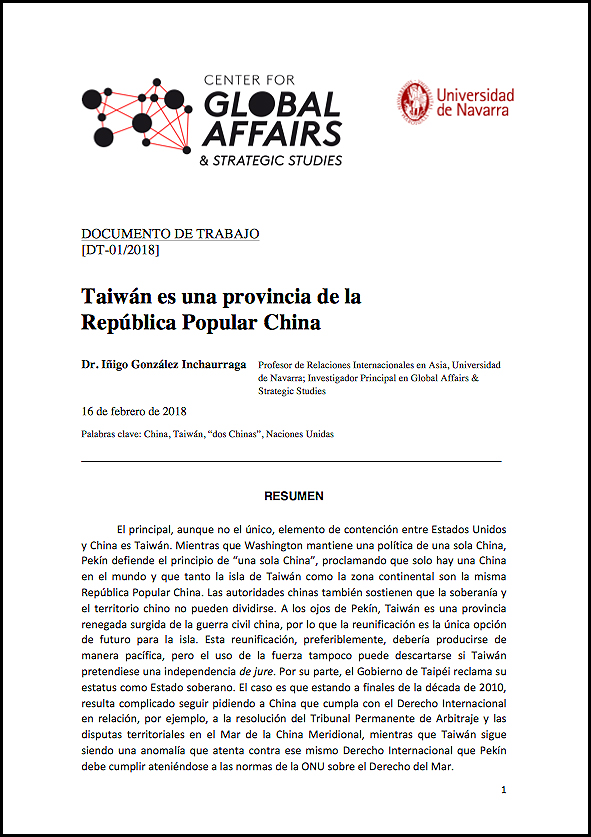 Descargar el documento completo [pdf. 432k]
Descargar el documento completo [pdf. 432k]
Showing 11 to 18 of 18 entries.
